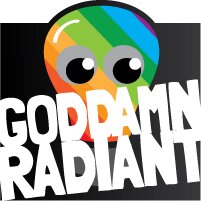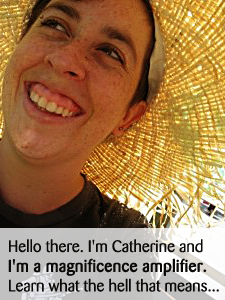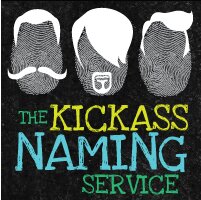Jenna was seventeen and she wanted more than anything, more than anything to be an artist.
She read and re-read biographies of artists, she studied and re-studied art books, she watched and re-watched movies about artists, and she repeatedly comforted herself and her artistic ambitions with the knowledge that her uncle Graham was a painter, and a good painter too, an Archibald finalist painter, so she would be a great artist too…
The day arrived! Jenna set up her easel and said, “Today… I make art!”
Three hours later Graham’s phone rang, and Jenna asked if she could come over.
“You live four hours away!” said Graham.
“…yes? Pleeeease…”
“Oh sure, as long as you tell your mum where you’re going.”
Late that afternoon, Jenna’s car pulled up outside her uncle’s house, and her uncle pottered out in paint-bedaubed pants and shirt to meet her.
“Oh, you’re painting!” said Jenna. “I’m sorry!”
“Nah, it’s okay,” said Graham. “I was nearly done for the day. There’s roast beef for dinner, I’ll just go clean up then you can tell me what’s so urgent.”
Jenna spent an exquisite half-hour browsing through the art books in Graham’s library until he reappeared with two cups of tea and some gingernut snaps.
“So, what’s the…”
“IwanttobeanartistbutIdon’tknowIsetupmyeaselandIrealised”
“Woah there! Slower.”
“Umm, this is really embarassing, but you know I always wanted to be an artist well I finally set up my easel and started to sketch out a figure and I spent an hour getting the proportions on the arm right and I realised that this was very boring and I don’t know does that mean I can’t be an artist?”
Graham sorted out her words in his head and said, “So you’re worried that because the work was boring that you’re not cut out to be an artist?”
“Yes! Oh my god I’m doooomed aren’t I just tell me quickly so I can go mourn all my hopes I mean I’ve wanted this my whole life but obviously it wasn’t mean to beeee…”
Graham observed kindly, “You sure are a dramatic one. Jen, what made you think that art was interesting all the time?”
“Well, people talk about how amazing it is and how engaged they are and in the books and all…”
“Hmmm. Well, if you can stay tomorrow I’ll show you what it’s like. Would that help?”
“Yes, that would be amazing, thank you Uncle Graham, you’re so wonderful…”
“Yeah. Well, you’re welcome, I guess. Did you know that you’re just like your mother when she was your age?”
The next day Jenna followed Graham out to the back shed where his studio was. It was an organised explosion of paints and stretched canvases and propped-open books and photos and rags and pedestal fans. Two large easels were set up: one with a large photo of an outback paddock, and another with a landscape-sized canvas with outlines pencilled on and a half-painted sky.
Conversationally, Graham said, “I’ve been working on this one for three weeks now, it’s a commission piece for the owner of that station. I went out there and took these photos, there’s some great light out there. Okay, I’m going to start. You can talk, but I don’t promise to answer.”
Graham took twenty minutes to mix four colours of blue. He daubed a bit on a scrap of newspaper, frowned, then spent another ten minutes adjusting the colours.
He added a small bit of blue to the canvas, scraped back some of yesterday’s still-tacky colour, built up the blue again, scraped off another bit, added a touch of pink to the mix, used the smaller brush to add in an invisible streak of tinted blue, stood back from the easel and stared for a minute, scraped off another bit of blue, repainted a few more times, stood back to look at the canvas while he stretched (back popping grotequely), then back to daub for another hour while humming under his breath.
Then Graham shook his head and blew his nose. He picked up his brushes and palette knife and spent fourteen minutes rinsing the brushes and soaking them in turpentine. He turned to Jenna. “So, that’s the morning of an artist. What do you think?”
“Umm… well, I mean no offense, right, but it looks kind of ordinary.”
“Yep, that’s it exactly.” He looked at her woebegone face. “But it’s still great, though. It can be both, you know.”
He laughed: now she looked confused and woebegone. “Close your eyes for a second, wouldya?”
Jenna closed her eyes and reopened them when directed. At arms length there was another painting on the easel.
It was… an overwhelming explosion of sunset colours that nature was surely too classy to put on display. A neon-darkness corona against old old trees. A gobsmacking extravaganza of life and how it always pulls your pants down when you least expect it.
Jenna gaped, eyes wandering. “It’s… wow. Amazing.”
“Well, thanks. But I made it the exact same way I’m painting that one over there. One quiet morning after another of scraping and building colour with the occasional cuppa tea. With lots of paintbrush-cleaning and other jobs I don’t particularly care for.”
“I guess, but…”
“But you’ve seen too many movies, pet. In the movies everything is done in montages that skip all the boring parts. And in books they write that it took so-and-so eight years to paint that portrait, but that’s just one line. It doesn’t describe every single one of those days, because most of those days are the same, and all of them involve quite a bit of very boring stuff: artist went for two-hour walk with dog, that kind of thing.”
“I guess I just thought it would all be magical.”
“Oh, don’t get me wrong, it still kind of is. Painting is the most fun you can have by yourself – don’ttellyourmotherIsaidthat – I mean, I forgot you were there for an hour or so. I don’t even mind the boringness of it all.”
“Why not?”
“The boring tasks… they let me think. They stop me from getting full of myself. And because you just have to do them, that’s all. To make roast beef you have to get a bit of blood on your hands, to make art you have to do a lot of boring ordinary work over and over. Still want to be an artist?”
“Umm, yes?”
“Good. I’m glad. Now get out of here, you have to be home before dark and we both know how your mum worries.”
The moral of the story
Here is a lesson it took me many years to learn; a lesson many people have not learned, especially about their marketing.
Doing magical work often feels the same as doing prosaic work.
Planning is entirely magical. Results are often pretty magical, too.
But doing the work is still doing the work: enjoyable, but very ordinary.
Here’s the important bit:
This doesn’t mean anything is wrong; it doesn’t mean that you need to make changes.
In regards to your marketing, the point where you start thinking, “Ho hum, I’m talking about this again, yawn” corresponds very closely to the point where people are starting to know you and remember you. (If you change your marketing so it feels bright and new and special, you reset the clock on memorability. Beware.)
Said another way:
How you feel about the work while you’re doing it isn’t a useful measurement of whether it’s any good.
Want to know about some measurements that are useful? Sign up for the Mo’Cash, Mo’Joy weekly newsletter and stay on the inside track!
![]() photo credit:
photo credit:







